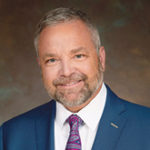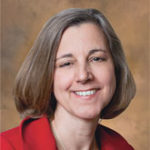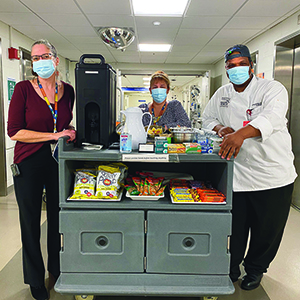Examining mental health among front-line clinicians as a side effect of the crisis
Work on the COVID front lines has been challenging and overwhelming—and for many healthcare professionals, their mental health is suffering.
A serious situation
Not surprisingly, job burnout rates among healthcare workers have worsened in the last year. COVID-19 frequently presents a depressing clinical scenario, with high morbidity and death rates. Because patients can’t have visitors in most hospitals, nurses serve as the liaisons, including helping dying patients say goodbye to friends and family through video calls. As a result, clinicians experience strong emotions ranging from fear, sadness, anger and helplessness—leaving them vulnerable to negative mental health effects. Yet, they are compelled to stay the fight.

“Because nurses and doctors are so dedicated to their jobs, the attrition level is lower than you would anticipate, even though they’re feeling burned out,” says HealthTrust Physician Advisor Kade Huntsman, M.D., Chief of Surgery at St. Mark’s Hospital in Salt Lake City, Utah. “They feel a sense of self-worth that they’re able to help fight this crazy pandemic.”
Many hospitals have made efforts to increase support for their staff as they tirelessly work their way through this bio-disaster.
A focus on mental health resources
At St. Mark’s Hospital, mental health practitioners meet regularly with ICU and other front-line staff to help them overcome the negativity surrounding this crisis. Staff are asked to complete a brief questionnaire that alerts providers as to how they’re feeling. Mental health specialists provide individual psychosocial support each day to nurses and others who have had a particularly bad day by listening to them talk about and process the situation.
“They are given coping mechanisms and tools to deal with their own depression and negative feelings from this busy, overworked condition,” says Dr. Huntsman. “It is always helpful to be able to talk to someone at work so that when you go home, you can recover from the event rather than continue dwelling on it.” This approach has rendered positive feedback from staff.
The national stigma around reaching out for help for a mental health issue only makes it harder to address the problem, so combating that stigma is a vital part of overcoming this crisis. “I hope that a good thing to come out of this is for people to know that it’s OK to talk about these situations,” says Dr. Huntsman.
The power of information
Leadership at St. Mark’s Hospital also sends daily email updates and holds weekly COVID-19 meetings. The email is brief and includes the number of patients currently in the hospital with COVID-19 and other helpful facts.
“These ongoing updates are very valuable because physicians and nurses are getting factual information about how clinical events are actually progressing, rather than sharing rumors,” says Dr. Huntsman.

Healthcare workers who haven’t yet seen high volumes of COVID-19 patients, or who aren’t on the front lines, can still experience anxiety. “When healthcare workers are in an area where there aren’t COVID patients, and they hear news about hospitals in other parts of the country experiencing PPE [personal protective equipment] shortages, bed shortages and overwhelmed staff, there can be a lot of anxiety from not knowing what situation might be headed their way,” says Karen Bush, MSN, FNP, BC, NCRP, Director of Clinical Research & Education at HealthTrust.
Providing access to timely, accurate and local community and facility-based information about COVID-19 can have a calming effect on staff and promote a sense of safety. “Communicate regularly with staff, and share authoritative updates from places like the NIH [National Institutes of Health], CDC [Centers for Disease Control and Prevention] and local health departments on how the situation is progressing,” says Bush. “Let them know what to expect and how you’re preparing, so no one is left in the dark with anxiety about what might be coming.”
Creative solutions & connections

Boston Medical Center (BMC) has found a simple yet powerful way to have those conversations. Beth Milaszewski, LICSW, an independent clinical social worker who specializes in trauma, has served BMC for four years. “When COVID initially started, my big concern was front-line staff were going to internalize the suffering, sorrow and death they were seeing,” she says. “So, I was proactive about visiting the floors and giving them a heads up of what to expect when you’re going through trauma during a crisis.” But she soon realized her “resilience rounds” were tough to do with providers in high-acuity, inpatient departments, who couldn’t come off the floor to talk and, at the same time, were more likely to experience intense stress.
She and two members of the food and nutrition team, Laura Elder and Charles Green, came up with a solution: a “resiliency cart” full of drinks and snacks for busy clinicians to refuel, regroup and talk. “It was for people coming together, and us bringing the watering hole to them,” she says. “It naturally progressed into something welcoming. The goal of this cart is to help the front line acknowledge what’s happening and destigmatize our stress response, so we can mitigate and manage it for ourselves and each other.”
For Green, ordering food for the cart, including crowd-pleasing candies, reminds him of being a kid in a candy store. “It just brings back those memories and that time of peace. If we can bring that feeling to what we offer through the cart, then it helps to share that peace. Food is the brightest part of a patient’s stay in the hospital. It’s something to look forward to … and it’s the same way with the cart.”
Green and Milaszewski credit Elder with making it something special. “Laura sets up the cart, and it looks like a six-star hotel. Everything is arranged so glamorous and fancy,” Green laughs. “When Beth pushes the cart around, the positive energy travels.” Milaszewski adds, “The employees feel cared for, and it’s a beautiful thing.”
Milaszewski says the cart opens the door to conversations and solutions for healthcare workers. “Part of my role is to be a bridge to other resources available to them,” she explains. For example, since the resiliency cart started, she has seen an uptick in the use of mental health services through the organization’s health insurance plan.
The team is brainstorming ways to expand the success of the resiliency cart to other areas of the hospital. In the meantime, the light at the end of the COVID tunnel is also helping reduce stress levels Milaszewski sees on her rounds. “The intensity on the floors has changed dramatically,” she says. “It’s palpable.”
- Offer free psychological and stress-management services in a variety of formats, such as in-person and virtual appointments, and individual and group therapy. Make sure staff know how to access these resources. The American Medical Association’s STEPS Forward Program offers educational guides and resources at edhub.ama-assn.org/steps-forward. The American Psychiatric Association also provides resources specific to physician burnout.
- Implement a 24/7 “warmline” (used for early intervention to prevent a crisis, whereas a “hotline” is for emergency situations) to a mental health professional. Post the number in highly visible spots for staff. Encourage them to call any time they need to talk.
- Start a peer support program. The “battle buddies” concept is borrowed from the military, and it works well for hospitals, too. Healthcare professionals are paired together based on clinical practice and encouraged to talk daily and develop a cadence where they can lean on each other for emotional support and feedback.
- Cheer for the front line. At the beginning of the pandemic, support flowed in from the community and businesses, with large thank-you signs, letters, meal deliveries, military flyovers and car parades, but the pandemic isn’t over. Encourage your community and local businesses to continue to show their appreciation and support.
- Celebrate patient care wins. Hospitals should continue to acknowledge when patients are weaned off ventilators, discharged or reach other care milestones. Some hospitals play a special song over the intercom, while others organize a cheer line to applaud patients as they leave.
- Prioritize vaccination of healthcare workers.
- Ensure staff always have adequate levels of personal protective equipment and other environmental controls so that they feel safe.
- Require staff to take breaks.
- Arrange hotels for staff who live a long distance from the hospital.
- Provide education on the signs of burnout and psychological stress.





